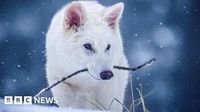Colossal Biosciences, a Texas-based biotech company, has recently made headlines by claiming to have revived the dire wolf, a species that went extinct over 10,000 years ago. This announcement, which coincided with the company’s cover feature in Time magazine on April 7, 2025, has sparked both excitement and skepticism within the scientific community.
The company has created three wolf pups named Romulus, Remus, and Khaleesi, which are reported to have been genetically engineered using techniques involving ancient DNA. The pups, aged between three to six months, exhibit features reminiscent of dire wolves, including long white fur and muscular jaws. They currently weigh around 36 kg and are expected to reach a mature weight of approximately 63.5 kg, according to Colossal’s research team.
Colossal’s efforts hinge on the use of CRISPR technology, a powerful gene-editing tool that allows scientists to modify specific segments of an organism's DNA. The company extracted DNA from a 13,000-year-old tooth and a 72,000-year-old skull fragment to analyze the genetic characteristics of the extinct species. They then modified the DNA of living grey wolves to incorporate traits associated with dire wolves, making 20 edits across 14 genes. This process resulted in the creation of embryos which were implanted in domestic dog surrogates, leading to the birth of the three pups.
However, independent experts have raised concerns about the validity of Colossal's claims. Vincent Lynch, a biologist at the University at Buffalo, stated, "All you can do now is make something look superficially like something else," emphasizing that the pups are not true dire wolves but rather genetically modified grey wolves. Similarly, Nic Rawlence, an associate professor at the University of Otago, pointed out that the ancient DNA is too degraded to clone, and thus, true de-extinction is impossible. He remarked, "What Colossal is trying to do is genetically engineering animals to look like extinct creatures."
Despite these criticisms, Colossal’s CEO, Ben Lamm, remains optimistic about the implications of their work. He believes that de-extinction and species preservation are intertwined, stating, "We think we're closer to de-extinction than the general public thinks." The company is also working on similar projects aimed at reviving other extinct species, including the woolly mammoth and the dodo.
The dire wolf, which roamed North America for over 100,000 years, is often associated with its portrayal in popular culture, particularly in the television series Game of Thrones. The recent announcement has reignited interest in the species, with many expressing excitement over the possibility of seeing these ancient creatures once again.
Interior Secretary Doug Burgum praised the project, calling it a "thrilling new era of scientific wonder." He expressed hope that de-extinction efforts could lead to the removal of certain species from endangered lists. Yet, experts caution that this focus on resurrecting extinct species should not detract from ongoing conservation efforts for existing endangered species.
Critics argue that resources allocated to de-extinction could divert attention from preserving current wildlife. Joe Walston, head of global conservation at the Wildlife Conservation Society, noted that many existing species are on the brink of extinction and require immediate conservation efforts. He said, "Sometimes we get too distracted by the newness of something and forget that what we have already on Earth at the moment is the most remarkable assemblage of species the world has ever seen."
As the debate continues, Colossal's pups are being cared for on a secure 2,000-acre preserve, monitored by on-site cameras and security personnel. The company has emphasized that their work is not merely about creating a spectacle but aims to inspire discussions about conservation and biodiversity.
In summary, while Colossal Biosciences' claim of bringing back the dire wolf is a remarkable achievement in genetic engineering, it raises significant questions about the ethics and implications of de-extinction. The scientific community remains divided, with many experts urging caution and advocating for a focus on preserving existing species rather than resurrecting those that have long been lost.




